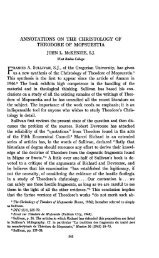Two Concepts of Attrition and Contrition - Theological Studies
Two Concepts of Attrition and Contrition - Theological Studies
Two Concepts of Attrition and Contrition - Theological Studies
Create successful ePaper yourself
Turn your PDF publications into a flip-book with our unique Google optimized e-Paper software.
26 THEOLOGICAL STUDIES<br />
For the moderns attrition is sufficient for justification in the sacrament<br />
when, according to the teaching <strong>of</strong> Trent, it excludes the will to sin<br />
<strong>and</strong> goes together with hope <strong>of</strong> pardon. These requirements <strong>of</strong> Trent<br />
are explained, for example by P. Galtier, 89 to mean that fruitful attrition<br />
dem<strong>and</strong>s faith, hope, love <strong>of</strong> desire for God, love <strong>of</strong> justice, <strong>and</strong><br />
even the desire <strong>of</strong> charity. Do these two descriptions <strong>of</strong> sufficient attrition<br />
differ or do they coincide?<br />
The least that can safely be said here is that the sufficient attrition<br />
<strong>of</strong> the moderns (if it is not already contrition in the Thomist sense, for<br />
it probably is), will certainly suffice to allow the change over from<br />
attrition to contrition which the Thomist theology <strong>of</strong> justification in<br />
the sacrament <strong>of</strong> Penance dem<strong>and</strong>s. It would, therefore, not really<br />
differ from the contrition which St. Thomas requires either before or<br />
at the moment <strong>of</strong> the absolution. 90 One <strong>and</strong> the same reality <strong>of</strong> repentance<br />
is merely viewed <strong>and</strong> described from different angles; the<br />
names attrition <strong>and</strong> contrition do not express here any objective<br />
difference.<br />
SCHEMATIC SYNTHESIS OF THE TWO CONCEPTIONS<br />
It should be clear now what are the real differences between the<br />
two conceptions <strong>and</strong> what are only apparent differences. We may then<br />
attempt a synthesis <strong>of</strong> both theories in all their elements where the<br />
differences are only apparent.<br />
A prerequisite to a possible synthesis is evidently that we should be<br />
aware <strong>of</strong> the different levels <strong>of</strong> reality on which the two conceptions<br />
move, ontological <strong>and</strong> psychological respectively, 91 <strong>and</strong> <strong>of</strong> the different<br />
89 De Paenitentia, p. 48.<br />
90 Cf. the suggestion made by De Vooght, La TMologie, p. 81: "on serait ainsi d'accord<br />
pour voir dans ^attrition d'amour la contrition de la theologie thomiste." Already in La<br />
Justification, p. 674, he had said: "Les qualitSs tres hautes que les attritionistes exigent de<br />
Pattrition suffisante permettent, semble-t-il, de Passimiler a la disposition unique dont<br />
parle saint Thomas."<br />
91 This difference is not always stated explicitly by De Vooght. Dondaine, op. cit.,<br />
pp. 52-53, clearly implies it. When De Vooght, La Causaliti, pp. 668 f., says: "un renouvellement<br />
psychologique Cet acte est un fait psychologique par ce que tout acte humain<br />
en est un," he may seem to say that a change, perceptible in the consciousness, is <strong>of</strong> necessity<br />
implied in the change over from attrito to contritus. But only apparently so. <strong>Contrition</strong>,<br />
or the effective renouncement <strong>of</strong> sin, is a psychological <strong>and</strong> human act. A sinner cannot<br />
give up his sin except knowingly <strong>and</strong> freely. And hence no conversion is possible without a<br />
psychological awareness <strong>of</strong> it. But the manifestation in the consciousness <strong>of</strong> this turning

















